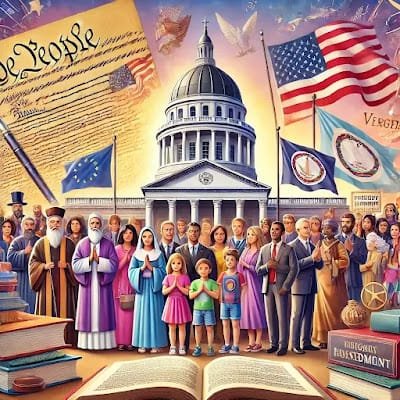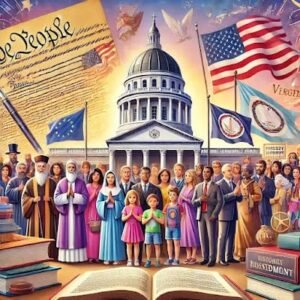National Religious Freedom Day: Understanding its History and Significance
By|TN HEADLINES24
The Historical Significance of January 16
Every year on January 16, Americans celebrate National Religious Freedom Day. This day honors the Virginia Statute for Religious Freedom, an important law passed in 1786. Written by Thomas Jefferson and supported by James Madison, this law was the first of its kind to protect a person’s right to choose their beliefs—or not to believe—without interference from the government.
This statute laid the foundation for the freedoms we enjoy today, ensuring that everyone can follow their conscience and practice their faith freely.
What Was the Virginia Statute for Religious Freedom?
In 18th-century America, many colonies enforced official state religions, requiring citizens to support them financially and follow their doctrines. Those who disagreed often faced legal penalties or societal ostracism. The Virginia Statute boldly declared that:
1. Government should have no authority over an individual’s religious beliefs.
2. Religion is a matter of personal conscience, not a duty imposed by the state.
The statute’s most radical element was its explicit rejection of state-supported churches and coercion in religious matters. It affirmed that religious liberty was not just a political right but a natural one, inherent to every individual.
How the Virginia Statute Shaped American History
The Blueprint for the First Amendment
The principles laid out in the Virginia Statute directly influenced the drafting of the First Amendment to the U.S. Constitution. Ratified in 1791, the First Amendment enshrined protections for religious freedom alongside freedoms of speech, press, assembly, and petition.
Jefferson and Madison viewed the statute as a cornerstone of democracy. By ensuring the separation of church and state, they believed they were safeguarding personal liberty and preventing the rise of religious tyranny.
Global Implications
The ideas expressed in the Virginia Statute have inspired movements for religious freedom worldwide. Nations striving for democracy often look to the U.S. model as a beacon of how diverse societies can coexist peacefully.
Why National Religious Freedom Day Is Relevant Today
Religious freedom remains one of the most important and debated rights in contemporary society. While the legal protections established by the First Amendment are robust, challenges persist.
Defending Against Discrimination
Even today, individuals and communities sometimes face discrimination based on their religious beliefs or lack thereof. National Religious Freedom Day serves as a reminder of the need to vigilantly defend this right for everyone, regardless of faith.
Fostering Unity in Diversity
The United States is one of the most religiously diverse nations in the world. Religious freedom allows people of different faiths—and those without faith—to coexist peacefully. By promoting understanding and tolerance, we create a stronger, more unified society.
Encouraging Personal Reflection
This day also prompts us to consider how we can uphold these values in our daily lives. Are we respecting others’ beliefs? Are we advocating for those whose rights may be at risk?
TN HEADLINES24 READERS’ INSIGHTS
Let’s hear from you, our readers:
Do you believe religious freedom is adequately protected in the modern era?
Have you ever encountered situations where someone’s religious rights were challenged?
What role do you think education plays in fostering religious tolerance?
Share your thoughts and experiences in the comments section below. Your insights are invaluable in sparking meaningful discussions!
TN HEADLINES24 BOTTOM LINE
National Religious Freedom Day is more than a historical commemoration—it’s a reflection of the enduring values that define the American spirit. The Virginia Statute for Religious Freedom, authored by Thomas Jefferson in 1786, continues to serve as a model for protecting individual rights and fostering inclusivity.
As we celebrate this day, let’s not forget the ongoing importance of defending freedom of conscience. Whether it’s speaking out against discrimination, educating ourselves about different faiths, or simply respecting the beliefs of others, we all have a role to play in ensuring this fundamental right endures for generations to come.
Join the conversation below and share your insights on this important topic! Explore more thought-provoking articles at TN HEADLINES24.
TN HEADLINES24 QUIZ|TEST YOURSELF
Test your knowledge about National Religious Freedom Day and its history with these 10 multiple-choice questions.
1. Who authored the Virginia Statute for Religious Freedom?
A. George Washington
B. Thomas Jefferson
C. James Madison
D. Benjamin Franklin
Answer: B. Thomas Jefferson
2. What year was the Virginia Statute for Religious Freedom enacted?
A. 1776
B. 1786
C. 1791
D. 1801
Answer: B. 1786
3. The Virginia Statute for Religious Freedom served as a foundation for which U.S. constitutional amendment?
A. First Amendment
B. Second Amendment
C. Fourth Amendment
D. Tenth Amendment
Answer: A. First Amendment
4. What does the Virginia Statute for Religious Freedom explicitly reject?
A. State-funded education
B. State-supported religion
C. Taxation without representation
D. Military drafts
Answer: B. State-supported religion
5. What date is National Religious Freedom Day observed annually?
A. January 15
B. January 16
C. February 14
D. March 16
Answer: B. January 16
6. Which founding father referred to the Virginia Statute as one of his greatest achievements?
A. Alexander Hamilton
B. George Mason
C. Thomas Jefferson
D. John Adams
Answer: C. Thomas Jefferson
7. In what state was the Virginia Statute for Religious Freedom enacted?
A. New York
B. Massachusetts
C. Pennsylvania
D. Virginia
Answer: D. Virginia
8. What does National Religious Freedom Day celebrate?
A. Establishment of a national religion
B. Freedom of conscience and belief
C. Creation of the Bill of Rights
D. Ratification of the U.S. Constitution
Answer: B. Freedom of conscience and belief
9. Who played a key role in pushing the Virginia Statute through the legislature?
A. John Jay
B. Patrick Henry
C. James Madison
D. Samuel Adams
Answer: C. James Madison
10. The First Amendment guarantees which of the following rights?
A. Freedom of religion
B. Freedom of speech
C. Freedom of press
D. All of the above
Answer: D. All of the above
TN HEADLINES24| VOCABULARY CHALLENGE
Challenge yourself with these multiple-choice vocabulary questions related to National Religious Freedom Day and its themes.
1. What does the term “statute” most closely mean?
A. Sculpture
B. Law
C. Policy
D. Agreement
Answer: B. Law
2. What does “conscience” refer to?
A. Religious doctrine
B. Inner sense of right and wrong
C. State policy
D. Political freedom
Answer: B. Inner sense of right and wrong
3. What does “liberty” mean?
A. Freedom
B. Wealth
C. Equality
D. Responsibility
Answer: A. Freedom
4. What does “ratification” mean?
A. Approval
B. Rejection
C. Revision
D. Debate
Answer: A. Approval
5. What does “amendment” mean in the context of law?
A. Repeal
B. Addition or change
C. Punishment
D. Compromise
Answer: B. Addition or change
6. What does “pluralism” signify?
A. A single dominant culture
B. Coexistence of diverse groups
C. Economic inequality
D. Political stability
Answer: B. Coexistence of diverse groups
7. What does “tyranny” mean?
A. Fair governance
B. Oppressive rule
C. Religious freedom
D. Democratic values
Answer: B. Oppressive rule
8. What does “equality” imply?
A. Equal rights for all individuals
B. State-imposed religion
C. Suppression of dissent
D. Freedom from taxes
Answer: A. Equal rights for all individuals
9. What does “coercion” mean?
A. Voluntary action
B. Use of force or intimidation
C. Peaceful negotiation
D. Legal amendment
Answer: B. Use of force or intimidation
10. What does “democracy” represent?
A. Rule by a monarch
B. Government by the people
C. State-sponsored religion
D. A dictatorial regime
Answer: B. Government by the people
Challenge your friends to take this quiz and see how well they do! Share your scores in the comments and let us know which section was your favorite.
Disclaimer:
The article, image, and quiz presented here are intended for informational and educational purposes only and reflect the values of National Religious Freedom Day. TN HEADLINES24 strives for accuracy but does not guarantee the completeness or reliability of the content. The image is an artistic representation and may not depict historical events literally. The quiz questions and answers are designed for engagement and may require additional research for verification. Opinions expressed in the article do not necessarily reflect those of TN HEADLINES24. Readers are encouraged to share their insights responsibly and respectfully.


